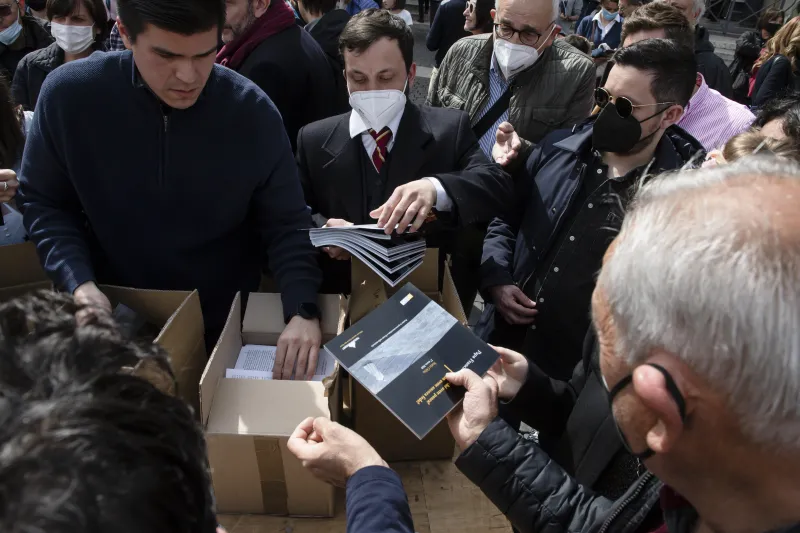
Vatican City, Mar 27, 2022 / 16:28 pm (CNA).
After his Angelus address on Sunday, Pope Francis remarked that it was the second anniversary of his offering an Urbi et Orbi blessing shortly early in the coronavirus pandemic.
“Precisely two years ago, in this piazza, we lifted up our plea for the end of the pandemic,” he said March 27 in St. Peter’s Square.
“Today, we have done so for an end to the war in Ukraine. At the Square’s entrances, you will be given a book as a gift, produced by the Vatican Covid-19 Commission with the Dicastery for Communication. It is an invitation to pray without fear during moments of difficulty, always having faith in the Lord.”
Some 10,000 copies of the book, commemorating the extraordinary Urbi et Orbi two years ago, were distributed to the pilgrims in the piazza.
The pope had held a holy hour of Eucharistic adoration followed by an Urbi et Orbi blessing before an empty and rain-covered St. Peter’s Square March 27, 2020.
The holy hour included a reading from the Gospel and a meditation by Pope Francis, who spoke about faith and trust in God during a time when people fear for their lives, as did the disciples when their boat was caught in a violent storm.
“We have an anchor: by his cross we have been saved. We have a rudder: by his cross we have been redeemed. We have a hope: by his cross we have been healed and embraced so that nothing and no one can separate us from his redeeming love,” Francis said in 2020.
Embracing Christ’s cross, he said, “means finding the courage to embrace all the hardships of the present time.”
“Embracing the Lord in order to embrace hope: that is the strength of faith, which frees us from fear and gives us hope,” the pope stated.
Present during the holy hour was a miraculous crucifix which the pope visited had visited earlier in March 2020 to pray for an end to the pandemic.
The crucifix, which usually hangs in San Marcello al Corso, was venerated as miraculous by Romans after it was the only religious image to survive unscathed from a fire that completely gutted the church on May 23, 1519.
An icon of Mary as Salus Populi Romani was also brought to the square for veneration during the prayer.
At the conclusion of the prayer, Pope Francis gave an extraordinary Urbi et Orbi blessing, and gave benediction with the Blessed Sacrament while the bells of the basilica rang.
In his meditation, Pope Francis entrusted everyone to the Lord through the intercession of the Blessed Virgin Mary, “from this colonnade that embraces Rome and the whole world.”
If you value the news and views Catholic World Report provides, please consider donating to support our efforts. Your contribution will help us continue to make CWR available to all readers worldwide for free, without a subscription. Thank you for your generosity!
Click here for more information on donating to CWR. Click here to sign up for our newsletter.






I pray that the pope and bishops will never again leave the faithful without the Mass and the Eucharist as they did in March 2020.
Well said, Lucy. The pope and bishops abandoning the faithful with the Mass and the Eucharist can only be called what it was: a sin, and one without parallel in the entire 2,000-year history of the Church that has been replete with deadly worldwide plagues. How many souls were condemned to Hell because they were deprived of the graces of Confession, Extreme Unction, and Viaticum? God is not mocked. He knows.
Paul, we pray for the dead, remember them at Mass and entrust them to God’s merciful love.
The current dangers are apathy toward the sacraments or bitterness toward those who have treated us unjustly. Although the injustice is real, don’t let bitterness give Satan an opening to your soul. Even good bishops made mistakes, as we all do. We need to pray for them!
I do hope they see the error in separating us from the sacraments and are resolved not to repeat it…